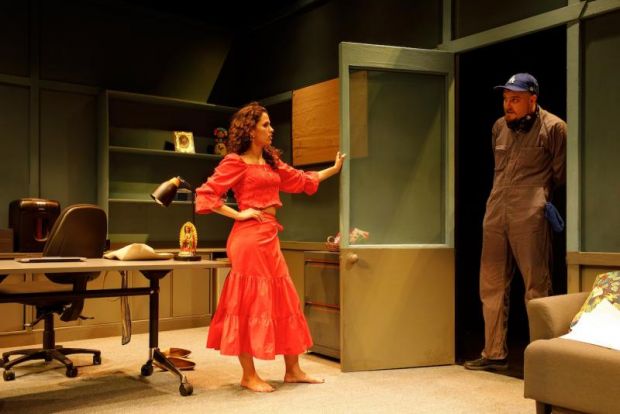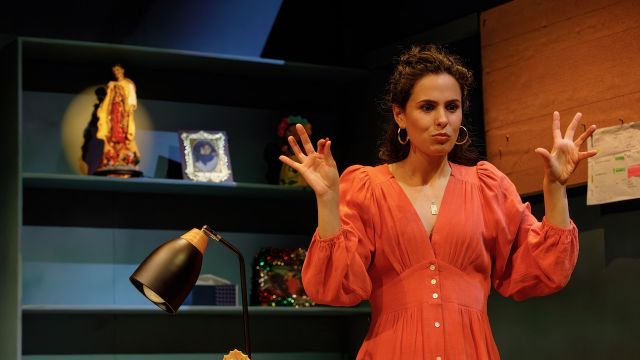Fade
Camila Pointe Alvarez sets a fast pace as newly employed writer in this funny but acidly insightful look at classism, marginalisation, sexism, bias and prejudice. While it’s set in Los Angeles, Alvarez’s character, Lucia, could be any migrant of different colour or religion or culture working in any white dominated organisation. Or any woman … or disabled person or …
Playwright Tanya Saracho uses humour and pacy storytelling to make her points. Lucia – and the office cleaner Abel – use her astutely written dialogue to explain the range – and effect – of condescension, underestimation, and pigeon-holing suffered by migrants as they try to make their way in a classist discriminatory society.
Lucia is voluble, outspoken, easily excited, and Alvarez plays her with increasing energy and drive. She moves fast, talks quickly, reacts emotionally. But she is resolute, unwavering in her determination to resist and overcome the ‘categorising’ of her new boss.

Abel, played by Casper Hardaker, veils his background almost stealthily. He is quiet, watchful, distrusting. Hardaker makes him wary, alert but disguises this with a laconic deliberateness, diligently doing his job, and almost hiding his constant caution.
Director Jeneffa Saracho uses Lucia’s energy and Abel’s restraint to paint a vibrant picture of the migrant experience – and how people react to it. Like Lucia, some rise up and find ways to work around it, sometimes surreptitiously. Others, like Abel, have tried that, and suffered, and now have valid reasons to lie low.
Alvarez and Hardaker play off each other expressively. Alvarez is a whirlwind of energetic reaction and emotion. She rants, sobs, collapses, rises determinedly. She’s impossible to resist – as her boss and another writer eventually realise.

Abel sees that strength, and eventually succumbs to her persuasive, caring friendship. He shares aspects of his life he usually hides, becoming more open, trusting – unfortunately.
The relationship between these two characters is forged skilfully by the playwright. Her dialogue builds both characters deftly, Lucia’s emotional outbursts balanced by Abel’s quiet interest and growing trust and confidence.
Alvarez and Hardaker work in harmony, creating a bond that Saracho builds into a climax that is somehow both disturbing and, disappointingly, predictable. There is fire in this story, a fire that Soldatic fuels by setting Alvarez a pace that seems even more frenetic when compared with Hardaker’s slow, studied movement and quiet introspection.

They work in harmony on a compact set designed by Melanie Liertz. Lucia works in her office. Abel drags his vacuum cleaner along the corridor outside and ‘hides’ to make phone calls in his storeroom across the way, visible through the scrim walls that also serve as a screen for subtitles that flash (at times too quickly) to translate short bursts of Spanish.
This is a play that says much about society – in the way that theatre does so well. Through characters that are real and identifiable; through words that are carefully chosen and bitingly effective; through direction that is astute and precise; and through acting that is perceptive, intelligent and acerbically real.
Carol Wimmer
Photographer: Phil Erbacher
Subscribe to our E-Newsletter, buy our latest print edition or find a Performing Arts book at Book Nook.

